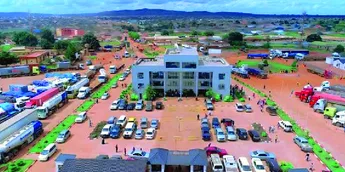DRC and Zambia sign a border deal for free-flowing trade

The Democratic Republic of Congo (DRC) and Zambia recently inked a border deal allowing for more free-flowing trade. Both countries agreed to allow trade to percolate in the region more seamlessly, particularly with a focus on the Kasumbalesa border which intersects them. The border is the second busiest land border in the SADC bloc.
A report by the East African disclosed that the DRC and Zambia recently agreed to make trade across borders easier, by signing a cooperation agreement under the regional bloc Southern African Development Community (SADC).
Ministers from both countries tabled a rough framework for cooperation and an action plan that has been put together to reach a long-term solution to the difficulties transporters face.
This point was emphasized by Peter Kazadi, the DRC Deputy Prime Minister in charge of the Interior and Security who noted that the DRC is continually looking for a lasting solution to the problems linked to the Kasumbalesa border.
“The incessant calls from transporters in the SADC network about the difficulties they encounter daily in carrying out their activities have reached our ears,” the Deputy Prime Minister stated.
“DRC is concerned about this situation, which is hampering the smooth flow of trade between our two countries. We have agreed to work together with Zambia and find a lasting solution to this situation,” he added.
The Deputy Prime Minister went on to state that the meeting between ministers for both countries “is an important step in the realization of the commitment of our two states, with the support of SADC, to overcome the obstacles hindering trade and cross-border traffic within our region”.
According to the East African, the Beitbridge border between South Africa and Zimbabwe is the busiest land border in the SADC followed by the Kasumbalesa border between the DRC and Zambia.
The Kasumbalesa is situated at the intersection of major commerce arteries in the area, including North-South Corridors, Dar es Salaam Development Corridor, Walvis Bay-Ndola-Lubumbashi Corridor, Beira Development Corridor, and Lobito Development Corridor.
Every day around 300 lorries pass the border carrying imported products as well as an additional 300 carrying goods intended for export as mentioned by tax expert Jérôme Sekana.
The two nations decided to match visa costs between the two states, establish advance customs clearance of goods to lessen traffic at borders and modernize borders to address all border infrastructure issues. They also decided to allow 24-hour border operations at border posts in Kasumbalesa, Sakania, Mokambo, and Kipushi.





